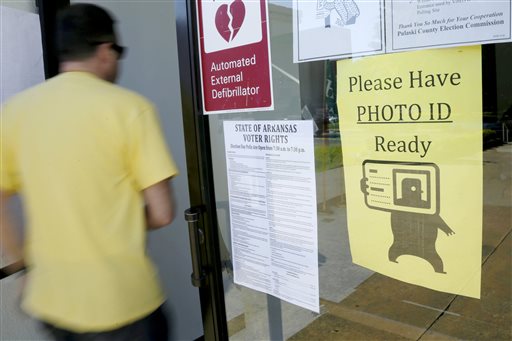LITTLE ROCK, Ark. (AP) — Arkansas’ highest court on Wednesday struck down a state law that requires voters to show photo identification before casting a ballot, ruling the requirement unconstitutional just days before early voting begins.
In a decision that could have major implications in the Nov. 4 election, the Supreme Court upheld a lower court ruling that determined the law unconstitutionally added a requirement for voting.
The high court noted the Arkansas Constitution lists specific requirements to vote: that a person be a citizen of both the U.S. and Arkansas, be at least 18 years old and be lawfully registered. Anything beyond that amounts to a new requirement and is therefore unconstitutional, the court ruled.
“These four qualifications set forth in our state’s constitution simply do not include any proof-of-identity requirement,” the ruling said.
Arkansas is among a handful of states where voter ID requirements have been in limbo. Last week, the U.S. Supreme Court allowed new restrictions to take effect in North Carolina but blocked Wisconsin’s ID requirement.
“We are thrilled that the Arkansas Supreme Court eradicated this artificial, vote-stealing law,” said Holly Dickson, legal director of the American Civil Liberties Union of Arkansas, which had sued to strike the law down. “It was an unconstitutional barrier that has already stolen legitimate voting rights and we are thrilled to see Arkansans’ voting rights restored.”
Wednesday’s ruling could impact political races in Arkansas, where early voting is set to begin Monday. The U.S. Senate race between Democratic incumbent Sen. Mark Pryor and his Republican challenger, U.S. Rep. Tom Cotton, is one of the most heated in the country, and the GOP views the seat as key in its bid to win control of that chamber.
It was unclear whether the ruling means the law will not be in effect Monday. Secretary of State Mark Martin’s office said he was reviewing legal options following the ruling and will defend the law “to the fullest extent possible.”
A spokesman for Attorney General Dustin McDaniel, a Democrat, said he was reviewing the decision.
The Republican-led Legislature approved the voter ID law last year, overriding a veto by Democratic Gov. Mike Beebe, and it took effect Jan. 1. It was later challenged in a lawsuit filed by the ACLU and the Arkansas Public Law Center on behalf of four voters they said would be disenfranchised by the requirement.
Democrats and Republicans split predictably on the court ruling. State Democratic Party Chairman Vince Insalaco called the decision “a win for all Arkansas voters,” while state GOP Chairman Doyle Webb said the court failed to “help restore the integrity of the ballot.”
Republicans in the Legislature said they planned to push for the voter ID requirement again, with House Majority Leader Ken Bragg saying he’d support adding to the 2016 ballot a proposed constitutional amendment for voter ID.
Sen. Bryan King, a Republican from Green Forest who sponsored the law, said he didn’t believe the oral arguments before the court gave supporters enough time to make their case.
“There has not been a day in court that our side really got to present both sides,” said King, who had argued it would ensure the integrity of elections.
Pulaski County Circuit Judge Tim Fox struck down the law in May but suspended his ruling while it was being appealed. Dickson said the ACLU planned to ask the judge to lift that stay.
The state’s previous law said election workers were required to ask for photo ID but that voters didn’t have to show it to cast a ballot. Under the law that was struck down, voters who didn’t show photo identification could cast provisional ballots — but those ballots were counted only if they provide ID to county election officials by noon Monday after an election.
Thirty-one states have laws in effect that require voters to show some form of identification before casting a ballot, according to the National Conference of State Legislatures. Seven other states have photo ID requirements in effect as strict as Arkansas’ law.
___
Associated Press writer Jill Bleed in Little Rock contributed to this report.

COMMENTS
Please let us know if you're having issues with commenting.